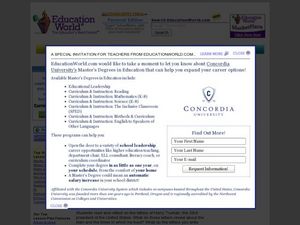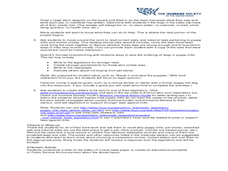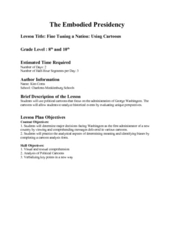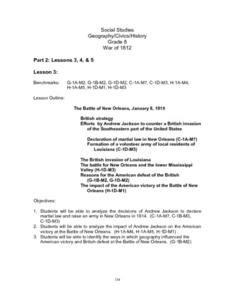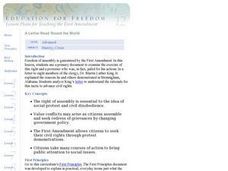Ohio Center For Law-Related Education
Four Activities: Thurgood Marshall and the Nomination and Confirmation of Federal Judges
The process of nominating and confirming federal judges can sound like a lot of bureaucratic hoops, but a resource breaks down the steps of the Supreme Court nominations in a simpler manner. Learners participate in four activities that...
Carolina K-12
African Americans in the United States Congress During Reconstruction
The Civil Rights Act of 1866, which granted citizenship to all males in the U.S., resulted in the first African Americans to be elected to Congress. Class members research 11 of these men, the challenges they faced, and craft...
North Carolina Consortium for Middle East Studies
Missing Pieces of the Puzzle: African Americans in Revolutionary Times
What's missing from most studies of the American Revolutionary War is information about the role African Americans played in the conflict. To correct this oversight, middle schoolers research groups like the Black Loyalists and ...
National Endowment for the Humanities
Ratifying the Constitution
Ratifying the Constitution was no simple task. Using primary sources, such as classic writings from the Federalists and Anti-Federalists, young scholars examine the arguments for and against the Constitution. They then decide: Would they...
Curated OER
Government Lesson Plan: Lesson 1
Students identify the powers of national and state governments. They evaluate the balance of national versus state power. They utilize worksheets imbedded in this plan to gain a deeper perspective of how the government powers are separated.
Curated OER
Powers of Government
Students explore and identify the power of national and state governments. They discuss the concept of federalism and the distribution of governmental powers. As a class, they examine the balance of power between the federal and state...
Curated OER
Satyagraha, Its Origins and Applications
Tenth graders study the steps and methods taken by Gandhi. In this World History instructional activity, 10th graders create illustrations to represent these steps. Students write a persuasive essay on these measures taken by...
Curated OER
The Lost Art of Letter Writing
Students discover the art of writing letters. In this writing lesson, students read letters written by President Harry Truman and then write a series of their own letters that would give insight into the times in which they live.
Curated OER
What is a Puppy Mill?
Students consider community and legislative efforts to stop puppy mills. In this animal welfare lesson plan, students discuss the needs of pets and determine how puppy mills do not meet the needs of animals. Students research...
Curated OER
Fine Tuning a Nation: Using Cartoons
Students examine political cartoons to gain an understanding of the political issues that George Washington faced. In this historical perspectives lesson plan, students analyze political cartoons about the National Bank, the title...
Curated OER
Rural Communities Make a Difference
Learners research what analysts say influenced Ohio voters in a Presidential election and discuss what that meant in the election, especially in Ohio. Students use provide Internet sources for research.
Curated OER
President Bush Balances Power
Students review the results of the November 2006 mid-term election. Using their text, they read the history of the balance of power and examine recent news articles. They present their findings to the class and may even hold a debate.
Curated OER
Good Citizens
Students consider what qualities and values make a good citizen. Students compare the requirements to become a U.S. citizen in 1896 to current requirements. Students create a country and write out the qualities a good citizen would possess.
Curated OER
United States Entry into World War I: Some Hypotheses About U.S. Entry
Students determine the most compelling evidence explaining why the U.S. entered WWI. They read and discuss a handout of reasons why the U.S. entered the war, and take a poll as to which reason was the most compelling.
Curated OER
What Does It Mean To Be a Good Citizen?
Students study citizenship and what it means to be a good sitizen. They create their own country and determine its citizenship rules. They work together to create a visual representation of what makes a good citizen.
Curated OER
Protecting your home from carbon monoxide
Pupils create and distribute flyers, mailings, posters in public areas to help make people aware of how to protect yourself from carbon monoxide. Students research what carbon monoxide is and what can be done to protect those in the...
Curated OER
Holiday Help for U.S. Sevicemen Overseas
Learners research what is possible locally and online to provide support for U.S. troops overseas during the holidays. Students also discuss what they would need to do to collect money or other items or launch a writing project.
Curated OER
Slip-Sliding Away... On the Way to School
Students research snow removal in their community. They survey students to find out if they are having problems with the walks on their way to school and how bad the problem is. Next, they organize the findings to present in class....
Curated OER
One Million Care Packages
Students read an article about sending care packages to soldiers in the United States military. Using the internet, they research the role of the USO and discuss their findings with the class. They find a local organization...
Curated OER
More Joy of Abstract Nouns 1
Students are provided with a list of 20 adjectives that they must generate abstract nouns to match. For example, the first term, luxurious, would prompt the answer luxury. Directions for this activity explain that abstract nouns don't...
Curated OER
Transcendentalism and Romanticism in American Literature
How do transcendentalists believe you must learn about the world? Use this PowerPoint to define transcendentalism and explain reason and intuition. Social, political, and philosophical influences of this time are introduced, and a few...
Curated OER
Mock Trial
Students rewrite a traditional fairy tale to represent the viewpoint of the villain. They participate in a mock trial of that villain in which all regular court participants (judge, jury, defendant, witnesses, plaintiff, etc) play roles.
Curated OER
War of 1812
Eighth graders locate the major land forms and bodies of water on a map of Louisiana. In groups, they discuss the role of the Mississippi River in the Battle of New Orleans and how land and water affect the outcome of battles. To end...
Curated OER
A Letter Read 'Round the World
Students examine primary document to examine the concept of free assembly, and analyze Dr. Martin Luther King Jr's letter to the clergy to explain the rationale for this tactic to advance civil rights.









